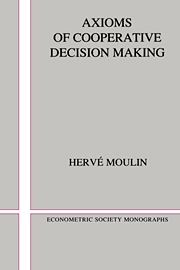4 - Cost-sharing games and the core
Published online by Cambridge University Press: 05 January 2013
Summary
Overview
A cooperative game in society N consists of a feasible utility set for the grand coalition N as well as a utility set for each and every coalition (non-empty subset) of N, including the coalitions containing one agent only. Each of those 2n —1 utility sets is viewed, as in the welfarist models of Part I, as a feasible set of cooperative opportunities: If the agents in a given coalition all agree on it, they can enforce any utility distribution in this set. The game model does not describe the course of action they must take to achieve this utility distribution. This must be made clear by each particular microeconomic model generating a cooperative game.
We view the cooperative game model as an extension of the axiomatic bargaining model (Chapter 3). The latter specifies the feasible utility set for the grand coalition TV and for each coalition containing a single agent. Indeed, the disagreement utility of an agent corresponds to his opportunity cost for joining the grand coalition. Thus, the only new ingredients in a cooperative game are the opportunity sets of intermediate coalitions (containing at least two, but not more than n — 1, agents).
- Type
- Chapter
- Information
- Axioms of Cooperative Decision Making , pp. 87 - 106Publisher: Cambridge University PressPrint publication year: 1988



